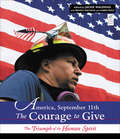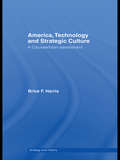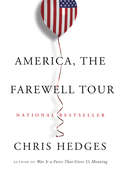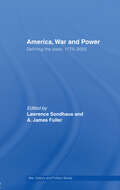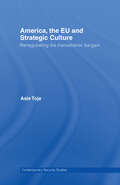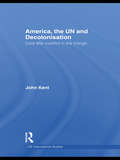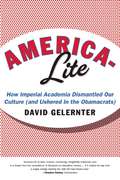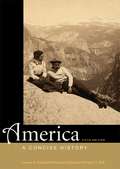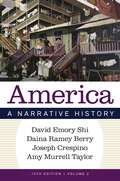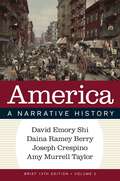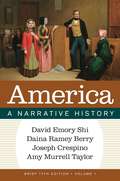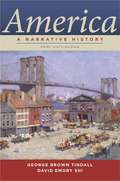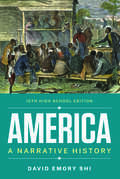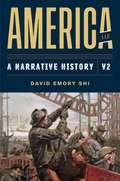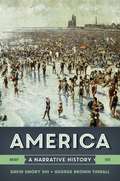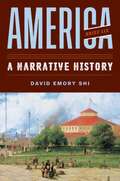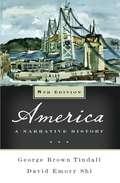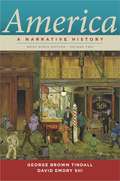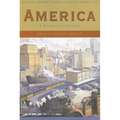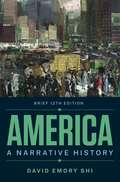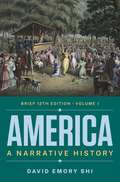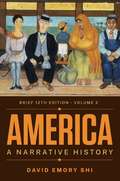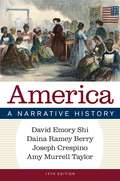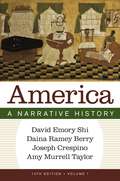- Table View
- List View
America, September 11th: The Triumph of the Human Spirit (Call to Action Books)
by Karen Frost Brenda WelchlinTrue stories of compassion, heroism, and kindness in the midst of a historic tragedy.Every tragedy has its heroes, and there were many in the terrorist attacks on New York City and Washington, D.C., on 9/11 and in the difficult days that followed. In this inspiring volume, Jackie Waldman, author of The Courage to Give, has collected the dramatic stories of some of the firefighters, rescue workers, police, medics, relatives searching for missing loved ones, and everyday people who, in the face of horror, sprang into action to save lives and help their communities. From the ASPCA leader who lost a sister that day and went on to lead an effort to rescue abandoned pets from the area, to the music student who went to Ground Zero to play for the toiling rescue workers, these vivid accounts, written in the immediate aftermath, paint a vivid picture of that infamous event—and remind us of what is best in us even in the worst of times.
America, Technology and Strategic Culture: A Clausewitzian Assessment (Strategy And History Ser. #Vol. 23)
by Brice HarrisThis book analyses the American way of war within the context of Clausewitzian theory. In doing so, it draws conclusions about the origins, viability, and technical feasibility of America‘s current strategic approach.The author argues that the situation in which America has found itself in Iraq is the direct result of a culturally predisposed incli
America, The Farewell Tour
by Chris HedgesIf you thought you knew Chris Hedges--be surprised. The globally renowned Pulitzer Prize-winner gives us an entirely new view of a nation in crisis in a stunning book that holds both liberals and conservatives to account--as rousingly pertinent for Canada as for the disoriented US. Beautifully written, it clarifies vividly and unforgettably the forces at play in our times.In astonishing, tough, first-hand reportage, Chris Hedges draws on stories from inside communities across America and reveals how the hurricanes of change have allowed an array of pathologies to arise: the opioid crisis, the retreat into gambling, the corporate coup d'état of government, the pornification of culture, the rise of magical thinking, the emboldening of violence and hate, the plagues of suicides, and the global upheaval caused by catastrophic climate change. These are just some of the physical manifestations of a society unravelling. Such ills presage a frightening reconfiguration of our lives--particularly in the face of our neighbour's degeneration as a world power.Donald Trump rode this disenchantment to power. Hedges--who was unsurprised by Trump's victory--shows how neither the left nor the right are addressing the systemic problems. Until the corporate coup d'état is reversed, these diseases will grow and ravage the country. A humane cry for a decent future, this remarkable book is our wake-up call to reality.
America, War and Power: Defining the State, 1775-2005 (War, History and Politics)
by Lawrence Sondhaus A. James FullerWritten by leading historians and political scientists, this collection of essays offers a broad and comprehensive coverage of the role of war in American history. Addressing the role of the armed force, and attitudes towards it, in shaping and defining the United States, the first four chapters reflect the perspectives of historians on this central question, from the time of the American Revolution to the US wars in Vietnam and Iraq. Chapters five and six offer the views of political scientists on the topic, one in light of the global systems theory, the other from the perspective of domestic opinion and governance. The concluding essay is written by historians Fred Anderson and Andrew Cayton, whose co-authored book The Dominion of War: Empire and Liberty in North America, 1500-2000 provided the common reading for the symposium which produced these essays. America, War and Power will be of much interest to students and scholars of US military history, US politics and military history and strategy in general.
America, the EU and Strategic Culture: Renegotiating the Transatlantic Bargain (Contemporary Security Studies)
by Asle TojeThis book provides a provocative analysis of relations between Europe and America during the tempestuous years 1998-2004. Analysing EU foreign policy, it concludes that the lessons learnt in interacting with America have been crucial in shaping the emerging EU strategic culture.The book challenges established orthodoxy regarding the sui generis nat
America, the UN and Decolonisation: Cold War Conflict in the Congo (LSE International Studies Series)
by John KentThis book examines the role of the UN in conflict resolution in Africa in the 1960s and its relation to the Cold War. Focussing on the Congo, this book shows how the preservation of the existing economic and social order in the Congo was a key element in the decolonisation process and the fighting of the Cold War. It links the international aspects of British, Belgian, Angolan and Central African Federation involvement with the roles of the US and UN in order to understand how supplies to and profits from the Congo were producing growing African problems. This large Central African country played a vital, if not fully understood role, in the Cold War and proved to be a fascinating example of complex African problems of decolonisation interacting with international forces, in ways that revealed a great deal about the problems inherent in colonialism and its end. This book will be of much interest to students of US foreign policy, the UN, Cold War history and international history in general.
America-Lite
by David GelernterAmerica-Lite (where we all live) is just like America, only turned into an amusement park or a video game or a supersized Pinkberry, where the past and future are blank and there is only a big NOW. How did we come to expect no virtue and so much cynicism from our culture, our leaders--and each other?In this refreshingly judgmental book, David Gelernter connects the historical dots to reveal a stealth revolution carried out by post-religious globalist intellectuals who, by and large, "can't run their own universities or scholarly fields, but are very sure they can run you." These imperial academics have deployed their students into the top echelon of professions once monopolized by staid and steady WASPs. In this simple way, they have installed themselves as the new designated drivers of American culture.Imperial academics live in a world of theory; they preach disdain for mere facts and for old-fashioned fact-based judgments like true or false. Schoolchildren are routinely taught theories about history instead of actual history--they learn, for example, that all nations are equally nice except for America, which is nearly always nasty.With academic experts to do our thinking for us, we've politely shut up and let second-raters take the wheel. In fact, we have handed the keys to the star pupil and teacher's pet of the post-religious globalist intellectuals, whose election to the presidency of the United States constituted the ultimate global group hug.How do we finally face the truth and get back into the driver's seat? America-Lite ends with a one-point plan.
America: A Concise History (Fifth Edition)
by James A. Henretta Rebecca Edwards Robert O. SelfWith fresh interpretations from two new authors, wholly reconceived themes, and a wealth of cutting-edge scholarship, the Fifth Edition of America: A Concise History is designed to work perfectly with the way you teach the survey today. Building on the book's hallmark strengths -- balance, explanatory power, and a brief-yet-comprehensive narrative -- as well as its outstanding full-color visuals and built-in primary sources, authors James Henretta, Rebecca Edwards, and Robert Self have shaped America into the ideal brief book for the modern survey course, at a value that can't be beat.
America: A Narrative History
by David E. Shi Daina Ramey Berry Joe Crespino Amy Murrell TaylorA best-selling narrative history enters a new generation The beloved and best-selling America: A Narrative History family of books has been used by millions of students because of its enthralling storytelling that brings history to life. Award-winning teachers and scholars Daina Ramey Berry (University of California, Santa Barbara), Joseph Crespino (Emory University), and Amy Murrell Taylor (University of Kentucky) join lead author David Shi (Furman University) to enhance the balanced narrative with a focus on the diverse experiences of women in American history. Seamlessly integrated into the reading experience, new tools help students to read at the college level and engage with the building blocks of history: primary sources.
America: A Narrative History
by David E. Shi Daina Ramey Berry Joe Crespino Amy Murrell TaylorA best-selling narrative history enters a new generation The beloved and best-selling America: A Narrative History family of books has been used by millions of students because of its enthralling storytelling that brings history to life. Award-winning teachers and scholars Daina Ramey Berry (University of California, Santa Barbara), Joseph Crespino (Emory University), and Amy Murrell Taylor (University of Kentucky) join lead author David Shi (Furman University) to enhance the balanced narrative with a focus on the diverse experiences of women in American history. Seamlessly integrated into the reading experience, new tools help students to read at the college level and engage with the building blocks of history: primary sources.
America: A Narrative History
by David E. Shi Daina Ramey Berry Joe Crespino Amy Murrell TaylorA best-selling narrative history enters a new generation The beloved and best-selling America: A Narrative History family of books has been used by millions of students because of its enthralling storytelling that brings history to life. Award-winning teachers and scholars Daina Ramey Berry (University of California, Santa Barbara), Joseph Crespino (Emory University), and Amy Murrell Taylor (University of Kentucky) join lead author David Shi (Furman University) to enhance the balanced narrative with a focus on the diverse experiences of women in American history. Seamlessly integrated into the reading experience, new tools help students to read at the college level and engage with the building blocks of history: primary sources.
America: A Narrative History
by George Brown Tindall David E. ShiAmerica has sold more than 1. 8 million copies over the past eight editions because it's a book that students enjoy reading. Effective storytelling, colorful anecdotes, and biographical sketches make the narrative absorbing and the material more memorable.
America: A Narrative History
by David E. ShiThe best-selling storytelling approach with tools that develop history skills. <p><p> America: A Narrative History High School Edition puts narrative front and center with David Shi’s rich storytelling style, colorful biographical sketches, and vivid first-person quotations. The new editions further reflect the state of our history and society by continuing to incorporate diverse voices into the narrative with new coverage of the Latino/a experience as well as enhanced coverage of gender, African American, Native American, immigration, and LGBTQ history. <p><p>With dynamic digital tools, including the InQuizitive adaptive learning tool, and new digital activities focused on primary and secondary sources, America: A Narrative History gives students regular opportunities to engage with the story and build critical history skills.
America: A Narrative History
by David Emory ShiAmerica is the leading narrative history because students love to read it. Additional coverage of immigration enhances the timeliness of the narrative. New Chapter Opener videos, History Skills Tutorials, and Norton's adaptive learning tool, InQuizitive, help students develop history skills, engage with the reading, and come to class prepared. What hasn't changed? Our unmatched affordability.
America: A Narrative History
by David Emory Shi George Brown TindallThis book seeks to improve upon a textbook grounded in a compelling narrative history of the American experience. An engaging book focused on political and economic developments but animated by colorful characters, informed by balanced analysis and social texture, and guided by the unfolding of key events. Those classic principles, combined with a handy format and low price, have helped make the book one of the most popular and well-respected American history textbooks. This Tenth Brief Edition of America features a number of important changes designed to make the text more teachable and classroom-friendly. Chief among them are major structural changes, including the joining of several chapters to reduce the overall number from thirty-four to thirty-two as well as the resequencing of several chapters to make the narrative flow more smoothly for students.
America: A Narrative History
by David Emory ShiAmerica is the leading narrative history because students love to read it. Additional coverage of immigration enhances the timeliness of the narrative. New Chapter Opener videos, History Skills Tutorials, and Norton’s adaptive learning tool, InQuizitive, help students develop history skills, engage with the reading, and come to class prepared. What hasn’t changed? Our unmatched affordability. Choose from Full, Brief (15% shorter), or The Essential Learning Edition--featuring fewer chapters and additional pedagogy.
America: A Narrative History
by George Tindall David ShiAmerica: A Narrative History, Tenth Edition
America: A Narrative History (8th Edition)
by David Emory Shi George Brown TindallA book students will read. The narrative wins students over with compelling storytelling, colorful anecdotes and biographical sketches that make the material more memorable. The text includes helpful in-text study aids, and a host of electronic media resources to help teachers teach and students learn. FEATURES Storytelling makes the material memorable An absorbing narrative wins students over, and includes colorful anecdotes and biographical sketches. A consistent narrative voice provides a clear path through the complexities of American history, with significant attention to social, cultural, economic, and political history. The compact trim size makes the book highly portable and readable, and the book's design supports the readability of the narrative-there are no boxes, inserts or pull-outs to interrupt the flow of the story. New pedagogy highlights core content Carefully crafted pedagogical features have been added to guide students through the narrative. Focus questions and chapter summaries work together seamlessly to highlight the core content that students need to know. Other in-text features include chapter chronologies and lists of key terms. New compelling theme on religion The Eighth Edition explores the role that religion has played in our everyday lives, our culture, and our politics throughout America history. David Shi highlights the effect of religion as a motivating force behind the settlement of the America, discusses its effects on the formation of the country, explores the influence of evangelical ideas and methods on social movements, looks at the role of religion during times of warfare, and analyzes the relationship between religion and state policy. The Norton Digital History Archive includes a new DVD on religion to support this compelling new theme in the text. Innovative emedia helps students learn and teachers teach The free student website provides a proven, assignment-driven plan for each chapter, and includes a wealth of study and review materials, including new interactive map quizzes, and American History Map Tours using Google Earth mapping technology to reinforce the relationship between geography and history. Resources for instructors include an Instructors Resource Disk, with PowerPoint lecture outlines and figures from the text, the Norton Digital History Archive (a seven DVD set with a new disc on religion), free coursepacks (using Blackboard, WebCT and other course management systems), an Instructors Manual, and a revamped Test Bank. The best companion primary source reader For The Record, Fourth Edition, by David Shi and Holly Mayer, serves as the perfect companion reader for America, Eighth Edition. For the Record includes a rich collection of 225 primary sources, both textual and visual, with just the right amount of pedagogy. The Fourth Edition includes a number of documents designed to highlight the new religion theme in the main text.
America: A Narrative History (Brief Ninth Edition) (Vol #2)
by George Brown Tindall David E. ShiAmerica has sold more than 1. 8 million copies over the past eight editions because it's a book that students enjoy reading. Effective storytelling, colorful anecdotes, and biographical sketches make the narrative absorbing and the material more memorable. The Brief Ninth Edition is 20% shorter, and includes refreshed and updated coverage of African American history, and has been streamlined from 37 to 34 chapters.
America: A Narrative History (Brief Seventh Edition)
by George Tindall David Emory ShiAmerica's political, social, cultural and environmental history.
America: A Narrative History (Brief Twelfth Edition) (Vol. Combined Volume)
by David E. ShiThe best-selling storytelling approach with tools that develop history skills America: A Narrative History puts narrative front and center with David Shi’s rich storytelling style, colorful biographical sketches, and vivid first-person quotations. The new editions further reflect the state of our history and society by continuing to incorporate diverse voices into the narrative with new coverage of the Latino/a experience as well as enhanced coverage of gender, African American, Native American, immigration, and LGBTQ history. With dynamic digital tools, including the InQuizitive adaptive learning tool, and new digital activities focused on primary and secondary sources, America: A Narrative History gives students regular opportunities to engage with the story and build critical history skills. This purchase offers access to the digital ebook only.
America: A Narrative History (Brief Twelfth Edition) (Vol. Volume 1)
by David E. ShiThe best-selling storytelling approach with tools that develop history skills America: A Narrative History puts narrative front and center with David Shi’s rich storytelling style, colorful biographical sketches, and vivid first-person quotations. The new editions further reflect the state of our history and society by continuing to incorporate diverse voices into the narrative with new coverage of the Latino/a experience as well as enhanced coverage of gender, African American, Native American, immigration, and LGBTQ history. With dynamic digital tools, including the InQuizitive adaptive learning tool, and new digital activities focused on primary and secondary sources, America: A Narrative History gives students regular opportunities to engage with the story and build critical history skills. This purchase offers access to the digital ebook only.
America: A Narrative History (Brief Twelfth Edition) (Vol. Volume 2)
by David E. ShiThe best-selling storytelling approach with tools that develop history skills America: A Narrative History puts narrative front and center with David Shi’s rich storytelling style, colorful biographical sketches, and vivid first-person quotations. The new editions further reflect the state of our history and society by continuing to incorporate diverse voices into the narrative with new coverage of the Latino/a experience as well as enhanced coverage of gender, African American, Native American, immigration, and LGBTQ history. With dynamic digital tools, including the InQuizitive adaptive learning tool, and new digital activities focused on primary and secondary sources, America: A Narrative History gives students regular opportunities to engage with the story and build critical history skills.
America: A Narrative History (Thirteenth Edition) (Vol. Combined Volume)
by David E. Shi Daina Ramey Berry Joe Crespino Amy Murrell TaylorA best-selling narrative history enters a new generation The beloved and best-selling America: A Narrative History family of books has been used by millions of students because of its enthralling storytelling that brings history to life. Award-winning teachers and scholars Daina Ramey Berry (University of California, Santa Barbara), Joseph Crespino (Emory University), and Amy Murrell Taylor (University of Kentucky) join lead author David Shi (Furman University) to enhance the balanced narrative with a focus on the diverse experiences of women in American history. Seamlessly integrated into the reading experience, new tools help students to read at the college level and engage with the building blocks of history: primary sources. This purchase offers access to the digital ebook only.
America: A Narrative History (Thirteenth Edition) (Vol. Volume 1)
by David E. Shi Daina Ramey Berry Joe Crespino Amy Murrell TaylorA best-selling narrative history enters a new generation The beloved and best-selling America: A Narrative History family of books has been used by millions of students because of its enthralling storytelling that brings history to life. Award-winning teachers and scholars Daina Ramey Berry (University of California, Santa Barbara), Joseph Crespino (Emory University), and Amy Murrell Taylor (University of Kentucky) join lead author David Shi (Furman University) to enhance the balanced narrative with a focus on the diverse experiences of women in American history. Seamlessly integrated into the reading experience, new tools help students to read at the college level and engage with the building blocks of history: primary sources. This purchase offers access to the digital ebook only.
